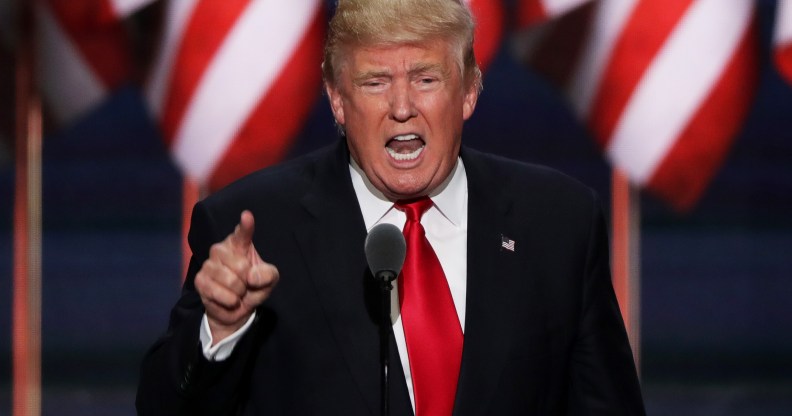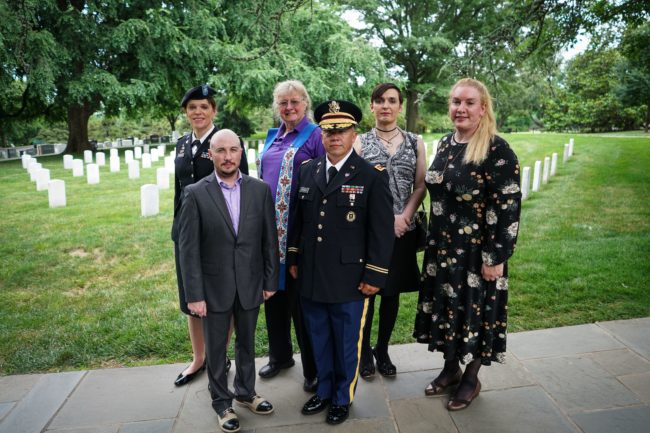US Supreme Court allows Trump transgender military ban

Donald Trump has been pushing for a ban on transgender people serving in the military since 2017 (Alex Wong/Getty)
The US Supreme Court has ruled in favour of President Donald Trump’s ban on transgender people serving in the military.
The court voted 5-4 on Tuesday (January 22) in favour of the Trump administration’s request to lift injunctions blocking the policy, which proposes to stop “transgender persons who require or have undergone gender transition” from serving. The policy does not affect trans servicepeople already serving, or trans people willing to serve “in their biological sex.”
The four liberal justices opposed the ruling, according to BBC News, but were overruled by their colleagues, including Trump appointees Neil Gorsuch and Brett Kavanaugh.
Several lower courts had opposed the ban and implemented injunctions against the Trump administration’s rulings. The challenges will continue to be heard in lower courts.
In response, a spokesperson for the Pentagon claimed that the policy is not a ban on trans servicepeople. Lt. Col. Carla Gleason told CNN: “As always, we treat all transgender persons with respect and dignity.
“DoD’s proposed policy is NOT a ban on service by transgender persons. It is critical that DoD be permitted to implement personnel policies that it determines are necessary to ensure the most lethal and combat effective fighting force in the world.
“DoD’s proposed policy is based on professional military judgment and will ensure that the US Armed Forces remain the most lethal and combat effective fighting force in the world.”
Activists react to transgender military ban
Lambda Legal, an LGBT+ civil rights group, called the Supreme Court’s ruling “perplexing to say the least,” in a statement reported by the Human Rights Campaign (HRC).
Lambda Legal counsel Peter Renn, whose group is involved with one of the court challenges to the trans ban, said: “The Supreme Court’s decisions today are perplexing to say the least: on the one hand denying the Trump administration’s premature request for review of lower court rulings before appellate courts have ruled and rebuffing the administration’s attempt to skirt established rules; and yet on the other allowing the administration to begin to discriminate, at least for now, as the litigation plays out.”
“Transgender troops have been serving our country openly with valour and distinction, but now the rug has been ripped out from under them, once again.”
— Lambda Legal counsel Peter Renn
“For more than 30 months, transgender troops have been serving our country openly with valour and distinction, but now the rug has been ripped out from under them, once again. We will redouble our efforts to send this discriminatory ban to the trash heap of history where it belongs.”
HRC national press secretary Sarah McBride said that the court’s decision to allow the transgender military ban to proceed “harms both transgender service members and our national security.”
“As this critical matter makes its way through the courts, brave transgender patriots deserve to have their constitutional rights protected,” she added.
“Today’s decision thrusts this administration’s discriminatory agenda onto a military that clearly doesn’t want it, and does so at the expense of transgender people’s careers and service—and we remain committed to fighting for all transgender troops.”
Trump moved to ban trans people from the military 18 months ago
In July 2017, Trump abruptly announced on Twitter that all transgender servicepeople would be purged and blocked from joining the US armed forces, claiming they were a burden on the military.
Trump tweeted: “After consultation with my Generals and military experts, please be advised that the United States Government will not accept or allow transgender individuals to serve in any capacity in the U.S. Military.
“Our military must be focused on decisive and overwhelming victory and cannot be burdened with the tremendous medical costs and disruption that transgender in the military would entail. Thank you.”

Transgender servicepeople like these troops are now under threat (MANDEL NGAN/AFP/Getty)
The announcement reversed an Obama administration policy which was set to allow transgender people to serve in the US military.
The ban was quashed by multiple courts in a string of legal battles which saw judges impose injunctions to stop the policy being enacted.
Judges in Washington state, Washington DC and California refused to rescind injunctions on the Trump administration implementing the ban, leading the government to ask the Supreme Court to fast-track its review of the policy.

